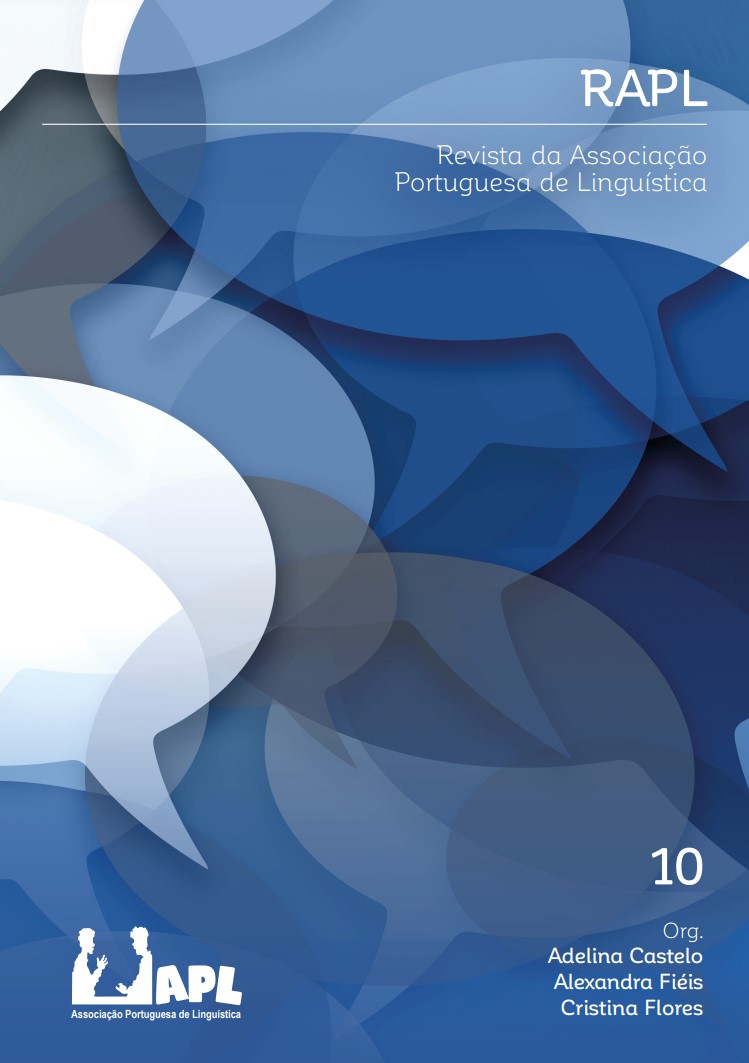Verbal mood in descriptions of denials of facts
DOI:
https://doi.org/10.26334/2183-9077/rapln10ano2023a11Keywords:
mood, indicative, subjunctive, propositional attitudes, veridicalityAbstract
The meaning of sentences that express the refusal of a fact involves two propositions: a complement clause that describes a fact, and the matrix proposition, that expresses the non-acceptance of the truth of the embedded proposition. In Portuguese, the mood that occurs in the complement clause is not the same in all constructions that convey this meaning. In some constructions, although there is an alternation between Indicative and Subjunctive in the complement clause, only with Indicative the interpretation that this proposition describes a fact of reality is observed. In other constructions, the mood of the complement clause is a matter of lexical selection, no alternation of mood being observed. Some factive predicates rule the Indicative, others rule the Subjunctive. In all these constructions the mood of the complement clause is explainable by mood analyzes in Portuguese available in the literature. However, there are two types of construction in Portuguese that express the refusal of the fact described by the complement clause and in which the mood of this clause is the opposite of the expected one. This text proposes a description of the meaning of these constructions, as well as an analysis of the Indicative and Subjunctive moods in Portuguese that explains in an integrated way the mood observed in all these constructions that express an attitude of rejection of the fact described by the complement clause.
Downloads
References
Giannakidou, Anastasia (1994) The semantic licencing of NPIs and the Modern Greek subjunctive. In Ale de Boer, Helen de Hoop, Henriette de Swart (orgs.) Language and Cognition 4, yearbook of the Research Group for Theoretical and Experimental Linguistics. University of Groningen, pp. 55-68.
Giannakidou, Anastasia & Alda Mari (2021) Truth and Veridicality in Grammar and Thought: Mood, Modality, and Propositional Attitudes. Chicago: Chicago University Press.
Godard, Danièle (2012) Indicative and subjunctive mood in complement clauses: from formal semantics to grammar writing. In C. Piñón (org.) Empirical Issues in Syntax and Semantics (9), pp. 129–148 em linha disponível em http://www.cssp.cnrs.fr/eiss9/ [consultado em maio 2023].
Heim, Irene (1992) Presupposition Projection and the Semantics of Attitude Verbs. Journal of Semantics 9 (3), pp. 183-221.
Lewis, David (1973) Causation. The Journal of Philosophy 70 (17), pp. 556–567.
Kennedy, Christopher (2007). The Grammar of Vagueness. Linguistics and Philosophy 30, pp. 1–45.
Marques, Rui (1995), Sobre o valor dos modos Conjuntivo e Indicativo em português. Dissertação de Mestrado, Faculdade de Letras da Universidade de Lisboa.
Marques, Rui (2022) Explaining the Subjunctive in factive contexts. Comunicação apresentada ao LSRL52, Univ. Winsconsin-Madison, 21-23 de abril de 2022.
Portner, Paul (2009). Modality. Oxford: Oxford University Press.
Quer, Josep (1998). Mood at the Interface. Utrecht: LOT.
Stalnaker, Robert (1979) Assertion. In Peter Cole (org.) Syntax and Semantics 9. New York Academic Press, pp. 315 - 332.
Villalta, Elisabeth (2008) Mood and gradability: an investigation of the subjunctive mood in Spanish. Linguistics and Philosophy 31 (4), pp. 467–522.
Downloads
Published
How to Cite
Issue
Section
License
Copyright (c) 2023 Rui Marques

This work is licensed under a Creative Commons Attribution-NonCommercial-ShareAlike 4.0 International License.
Authors retain copyright and concede to the journal the right of first publication. The articles are simultaneously licensed under the Creative Commons Attribution License, which allows sharing of the work with an acknowledgement of authorship and initial publication in this journal.
The authors have permission to make the version of the text published in RAPL available in institutional repositories or other platforms for the distribution of academic papers (e.g., ResearchGate).




